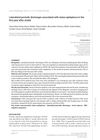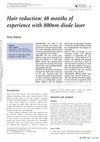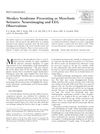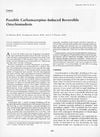 9 citations,
March 2001 in “Clinics in dermatology”
9 citations,
March 2001 in “Clinics in dermatology” Hirsutism in women is often due to hormone sensitivity and has significant psychological effects.
 3 citations,
June 2015 in “Serbian Journal of Dermatology and Venereology”
3 citations,
June 2015 in “Serbian Journal of Dermatology and Venereology” The conclusion is that cerebrovascular diseases can cause seizure-like activity in stroke patients, which can be improved with antiepileptic drugs.
 1 citations,
September 2017 in “Frontiers in Laboratory Medicine”
1 citations,
September 2017 in “Frontiers in Laboratory Medicine” Gut flora changes could potentially indicate depression, but more research is needed.

PCOS is a common hormonal disorder with symptoms like irregular periods and excess hair growth, managed with lifestyle changes and medications.
 115 citations,
January 2001 in “American journal of clinical dermatology”
115 citations,
January 2001 in “American journal of clinical dermatology” Eflornithine cream effectively reduces women's unwanted facial hair but hair returns if treatment stops.
 112 citations,
July 1998 in “Journal of Investigative Dermatology”
112 citations,
July 1998 in “Journal of Investigative Dermatology” Ruby laser pulses best destroy hair follicles during the growth phase and effectiveness varies with laser intensity; melanin is key for targeting, and timing treatments can improve results.
 67 citations,
October 1997 in “Dermatologic Surgery”
67 citations,
October 1997 in “Dermatologic Surgery” The EpiLight Hair Removal System removed about 60% of hair with some side effects, and more research is needed to confirm long-term effectiveness.
 60 citations,
September 1979 in “Fertility and sterility”
60 citations,
September 1979 in “Fertility and sterility” Spironolactone can reduce hair growth in women with hirsutism.
 49 citations,
July 2004 in “Anesthesiology”
49 citations,
July 2004 in “Anesthesiology” The document concludes that more research is needed to understand how to treat muscle pain with drugs.
 45 citations,
June 2004 in “Lasers in Medical Science”
45 citations,
June 2004 in “Lasers in Medical Science” Intense pulsed light (IPL) is an efficient and safe method for hair removal, reducing hair by about 80%.
 44 citations,
June 1985 in “Fertility and sterility”
44 citations,
June 1985 in “Fertility and sterility” Combination drug therapy is effective for hirsutism that doesn't improve with just one medication.
 41 citations,
December 2016 in “International Journal of Women's Dermatology”
41 citations,
December 2016 in “International Journal of Women's Dermatology” Hormone therapy and surgeries for transgender individuals affect their skin and hair, requiring specific dermatologic treatments and respectful care.
 31 citations,
January 2017 in “Phytotherapy Research”
31 citations,
January 2017 in “Phytotherapy Research” Ziziphus jujuba Mills may have health benefits, but more research is needed to confirm its safety and effectiveness.
 27 citations,
December 2001 in “Clinical and experimental dermatology”
27 citations,
December 2001 in “Clinical and experimental dermatology” Different hair removal methods have pros and cons, and more evidence is needed to prove laser treatments work.
 23 citations,
April 1999 in “Dermatologic Clinics”
23 citations,
April 1999 in “Dermatologic Clinics” Pulsed-intense light can significantly reduce hair, with effectiveness depending on treatment number and timing, and has mild side effects.
 21 citations,
April 2011 in “Epilepsia”
21 citations,
April 2011 in “Epilepsia” The drug combination significantly reduced epileptic drop attacks in patients.
 20 citations,
December 2003 in “Journal of Cosmetic and Laser Therapy”
20 citations,
December 2003 in “Journal of Cosmetic and Laser Therapy” An 800nm diode laser safely and effectively reduces hair for about 8 months, with most patients satisfied and few side effects.
 19 citations,
May 2007 in “Dermatologic therapy”
19 citations,
May 2007 in “Dermatologic therapy” The document concludes that various treatments, including laser therapy, are effective for managing pseudofolliculitis barbae, especially in darker skin types.
 19 citations,
January 2001 in “Journal of cutaneous laser therapy”
19 citations,
January 2001 in “Journal of cutaneous laser therapy” The Nd:YAG laser safely reduces facial hair and slows regrowth, with patient satisfaction.
 17 citations,
January 2013 in “Indian Journal of Pharmacology”
17 citations,
January 2013 in “Indian Journal of Pharmacology” High levels of the seizure medication sodium valproate can cause hair loss.
 17 citations,
October 2002 in “Dermatologic Surgery”
17 citations,
October 2002 in “Dermatologic Surgery” Successful surgical hair restoration requires careful planning, precise execution, and proper aftercare, using techniques like follicular unit transplantation and correct hair angling for best cosmetic results.
 15 citations,
April 2007 in “Journal of child neurology”
15 citations,
April 2007 in “Journal of child neurology” An 11-month-old boy with Menkes disease had severe brain shrinkage and abnormal blood vessels, and didn't respond well to treatment.
 15 citations,
August 1998 in “Australasian journal of dermatology”
15 citations,
August 1998 in “Australasian journal of dermatology” The document concludes that various cosmetic and drug treatments are available for hirsutism, and some new drugs show promise.
 14 citations,
March 2012 in “Lasers in Surgery and Medicine”
14 citations,
March 2012 in “Lasers in Surgery and Medicine” A low-power, fast laser safely reduces hair with minimal pain and few side effects.
 13 citations,
January 2014 in “Aesthetic Surgery Journal”
13 citations,
January 2014 in “Aesthetic Surgery Journal” Cyperus rotundus oil effectively reduces unwanted hair without side effects.
 13 citations,
November 2013 in “Seizure: European Journal of Epilepsy”
13 citations,
November 2013 in “Seizure: European Journal of Epilepsy” Levetiracetam may cause hair loss, which can potentially reverse with lower doses or stopping the drug.
 13 citations,
September 2002 in “Dermatologic Surgery”
13 citations,
September 2002 in “Dermatologic Surgery” Effective repair of bad hair transplants requires skilled techniques and careful use of donor hair, with strategies like reimplantation and camouflage, and new methods to minimize scarring.
 13 citations,
September 1989 in “International Journal of Dermatology”
13 citations,
September 1989 in “International Journal of Dermatology” Carbamazepine may cause reversible nail detachment.
 11 citations,
February 2008 in “British journal of nursing”
11 citations,
February 2008 in “British journal of nursing” Idiopathic hirsutism causes excessive hair growth in women, can be treated with medication and hair removal, but cannot be fully reversed.
 10 citations,
January 2013 in “Journal of The European Academy of Dermatology and Venereology”
10 citations,
January 2013 in “Journal of The European Academy of Dermatology and Venereology” The home-use IPL device effectively reduced hair and delayed its regrowth after six months of use, with users happy and no negative side effects.






























